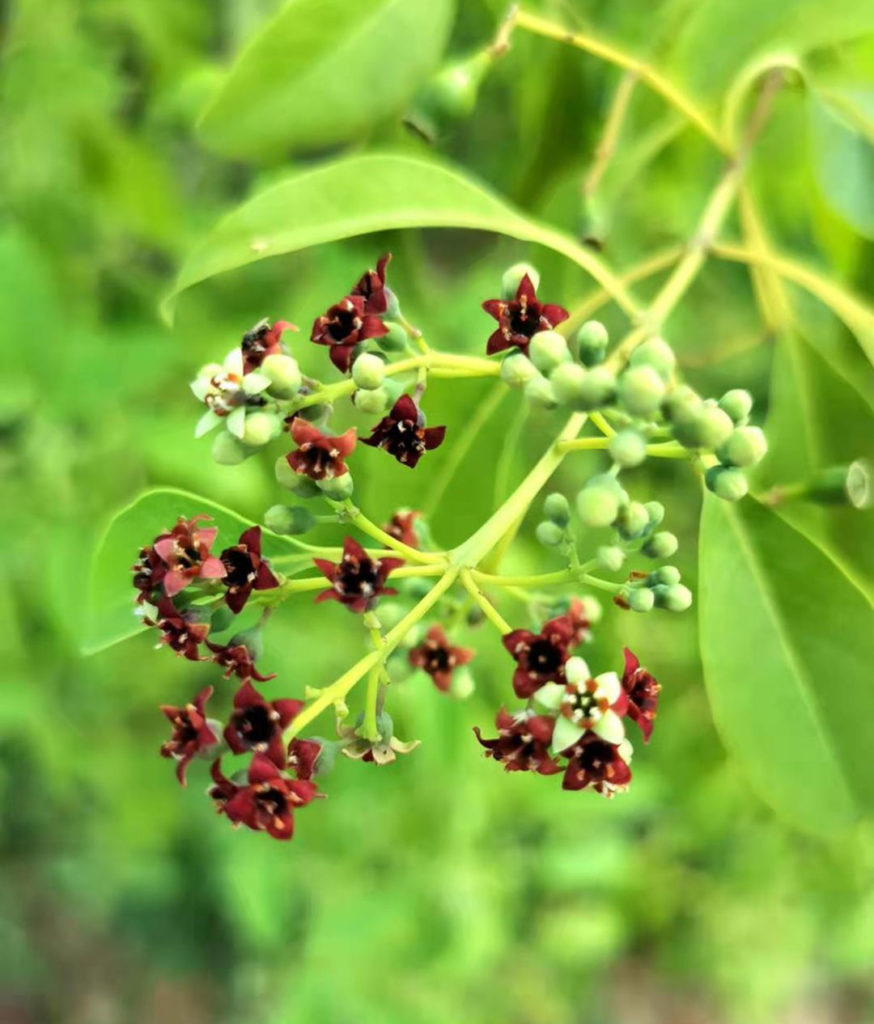
India
Sandalwood
Santalum album

General Description / Cultural Significance
The use of sweet-scented sandalwood, Santalum album, is traditional in India. It is a sacred tropical tree that is both holy and medicinal, and native to southern India. The oil from sandalwood is antiseptic and an astringent, and in India especially the oil is used to treat inflammatory skin diseases like psoriasis. It nourishes skin when applied topically, and it also is reported to have antimicrobial, antioxidant, and anticancer effects. Its warm scent has also made it incredibly popular in perfumes and in aromatherapy, used to produce a relieving, soothing effect when someone experiences stress or anxiety. In Indian culture, many carved objects from sandalwood have religious significance, and the wood itself is valued because intricate designs can easily be etched into it. Small boxes and articles are often produced from sandalwood too.
Climate Change/Conservation Status
One-fifth of the world’s population lives in India. Their health status is largely dependent on local plant medicine. Climate change is an additional risk to these plants. The impact of extreme heat waves and drought continues to be very deadly to humans and other life forms. In 2016, India had its hottest day on record when the temperature hit 51°C in the city of Phalodi, Rajasthan. A study released in July 2017 found that rising temperatures have contributed to the suicides of approximately 60,000 Indian farmers over the past 30 years. In 2015, one of the worst years on record, about 12,602 farmers killed themselves in all of India. Overall, more than 300,000 farmers and farm workers have killed themselves in the country since 1995.
India, as the third largest emitter of greenhouse gases on the planet must keep its promise to cut carbon and its pledge to produce 40% of its energy from renewables by 2030. They also must complete reforestation efforts that will absorb up to 3 billion tons of CO2 by that same year. Climate change is currently causing extreme weather and natural disasters that are rapidly increasing the number of people at risk in the country.
The International Union for Conservation of Nature (IUCN) Red List of Threatened Species has listed sandalwood as Vulnerable to extinction. Even though much has already been done in India to protect the tree, there is much more needed in the scale of conservation efforts. Because Sandalwood is such a culturally significant plant, its cultivation is leaving the domain of forestry to include the active participation of other cultural stakeholders and local organizations. Demand still exceeds its supply. Illegal harvesting and exploitation of sandalwood that have contributed tto its decline, have been brought under control by the government, who has imposed an export ban on sandalwood and established conservation measures to protect the tree across the country and expand its distribution range.
In a 2022 report of analyzed attribution led by Friederike Otto of the World Weather Attribution, it was found that it is warming of the planet that is creating relentless heat waves like the current one occurring in India. This heat wave has caused flooding from melting glaciers in the Himalayas, widespread power shortages because of strains to the system, and damaged India’s wheat crop contributing to the growing global food crisis. It is predicted that extreme heat events and other damaging effects of global warming will increase and continue to impact the poor disproportionately.
Alternate Names
Chandan
Cendana
East Indian sandalwood
Indian sandalwood
Sandal
Sandal tree
Peetchandan
White Indian Sandalwood
Sources
American Association for the Advancement of Science, 2015. Science. American Association for the Advancement of Science, 9 (350)6257, p. 140. ISSN: 00368075
Arunkumar, A.N., Dhyani, A., & Joshi, G., 2019. Santalum album. The IUCN Red List of Threatened Species. [website] DOI: 10.2305/IUCN.UK.2019-1.RLTS.T31852A2807668.en.
Asian Regional Workshop (Conservation & Sustainable Management of Trees, Viet Nam, August 1996), 1998. Santalum album. The IUCN Red List of Threatened Species. [website] DOI: 10.2305/IUCN.UK.1998.RLTS.T31852A9665066.en
Drugs, n.d. Sandalwood. Drugs. [website]
France-Presse, A., 2016. India records its hottest day ever as temperature hits 51C (that’s 123.8F). Guardian News & Media. [website]
Safi, M., 2017. Suicides of nearly 60,000 Indian farmers linked to climate change, study claims. Guardian News & Media. [website]
Permanent mission of India to the United Nations. This statement can be found on the World Sensorium original website.
Fountain, H., New York Times, May 24, 2022, P. A4

